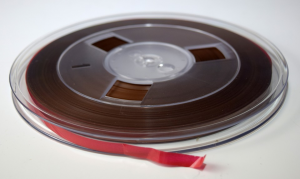
In the 1990s, I began collecting rare World War II radio news broadcasts. My expectation was that many such recordings would be archived by the big networks: CBS, NBC and ABC. If those sources didn’t pan out, surely the then still living war correspondents would have copies of their historically important work. I was mainly interested in the broadcasts of CBS correspondents Eric Sevareid and William L. Shirer — remaining members of “Murrow’s Boys.”

To my surprise, the networks had almost nothing — two or three audio tracks they were retaining to play when the two aged newsmen passed away. My search options were few, again this was the early ’90s and prior to internet search engines. Plan B: I wrote personal letters to Sevareid (through CBS) and to Shirer (through his publisher Simon & Schuster.)
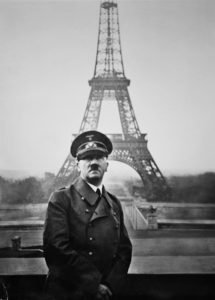
The two men replied but, to my disappointment, they had almost nothing on tape from the wartime years. That was too bad, because there was one audio track I really hoped to find. When France was overrun by Hitler’s troops, Sevareid had broadcast an eloquent eyewitness description of the tragedy: “Paris died like a beautiful woman in coma.” I wanted those words in his voice, not a written transcript of what Sevareid had said.
In pursuit of information, I studied textbooks on war correspondents and the timeline of wartime events. I ordered catalogs from companies that sold old time radio shows. Ultimately, the best collection of WW II audio in the country was at the University of Washington. During the war years, KIRO radio in Seattle had recorded most of the CBS evening news broadcasts. Eventually the station donated the collection to the university. U.W. staff, organized by an archivist named Milo Ryan, had gone through thousands of recordings and created a catalog titled “History in Sound.” The catalog was a lifesaver for a researcher, but the descriptions within were condensed down to a few words. It took considerable effort to prepare a list of what I suspected to be among the most significant sound recordings.
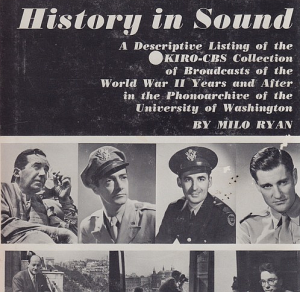
With a cassette recorder in hand, and after five trips to Seattle, I finally had copies of the news broadcasts that were on my list. Immediately, I sent Sevareid and Shirer copies of their material. At a later date, I will describe my correspondence and interactions with William L. Shirer. For the remainder of this article, my focus will be on Eric Sevareid.

Eric Sevareid was born in Velva, North Dakota in 1912. He graduated from the University of Minnesota in 1935. That was just in time to become a correspondent for the new medium known as radio. Radio news had yet to be invented when Sevareid joined CBS. He was a key figure at the network from 1939 (as the war in Europe began) until his retirement in 1977. Most baby boomers will best remember Sevareid as the longtime television news analyst and commentator on the CBS Evening News with Walter Cronkite.
During the early days of the war in Europe, Sevareid reported from France (until the country surrendered) and then he moved to the London office. Shortly thereafter, Sevareid returned to America for a few years. But as the allied offensive gathered steam in the early ’40s, Sevareid went back into the danger zones: Africa, Italy and Burma. Sevareid was an innovator. During the war years he and Murrow’s Boys were not simply reporting on the war, they were giving birth to the field of radio news analysis and commentary.
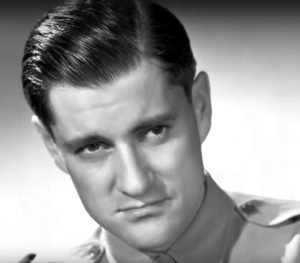
One of my prized recordings is Sevareid’s October 1940 report from London. Edward R. Murrow provides an introduction, then Sevareid contrasts the sudden collapse of France to the fighting spirit and tenacity of Winston Churchill’s Great Britain. By locating this recording, I had achieved one of my goals: It includes, in Sevareid’s own voice, the descriptive words I had been seeking: “Paris died like a beautiful woman in coma, without struggle, not knowing or even asking why.”
I have kept this tape to myself since the ’90s, other than I did send a copy to Sevareid, and the BBC received one as part of a tape exchange. Regardless, it has never become an accessible archival item that historians or the public could locate. A month ago, I decided that I should share it. The recording is important: In Sevareid’s opinion, it was one of his most significant broadcasts. My thought is it should be preserved, not someday lost in my metal filing cabinet in the basement or in an archival folder at the BBC.
I have now uploaded the recording to YouTube. Anyone, who doesn’t care for the era appropriate photos that back the sound track, can simply close their eyes or copy the sound. Either technique reverts it back to the shortwave transmission that was sent from Europe to the United States back in 1940. (Many overseas broadcasts came into American networks by shortwave radio, where they were recorded and then rebroadcast by the networks.)
Some of the letters I received from Sevareid are humorous. In one he thanked me for the cassette recordings and then said he would listen to them “just as soon as his wife got her cassette player fixed.” Here’s a faded copy of one letter from Sevareid.
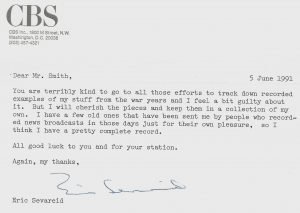
Eric Sevareid, one of the forefathers of radio and television news, passed away in July 1992 — one year after he sent this letter. In the future, I will write about my interactions with the famous author (The Berlin Diary, The Nightmare Years, etc.), and CBS war correspondent, William L. Shirer. That post will be here at QZVX: It will include rare archival audio, photos and copies of letters from Shirer.
To read about Lorne Greene, a pioneering Canadian network anchorman during WW II and later an actor in the U.S. , please click here.


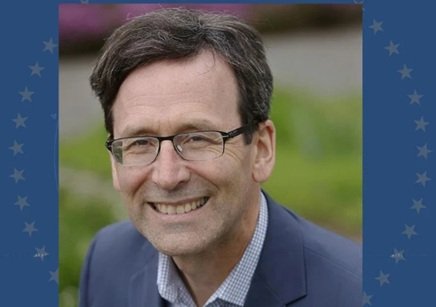
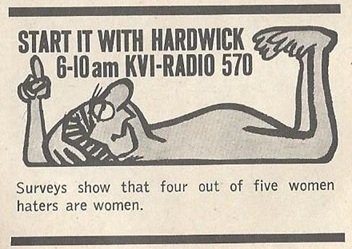
November 1, 2021 at QZVX
Deborah Browning Schimek says:
Thanks for responding Steven. He would not have broadcast from the camp. It would have been forbidden. But he may have spoken about it after he had returned to Le Mans, which is where he was based at the time. Unfortuantely I don’t have a specific date, although I will try to see if I can narrow it further. Perhaps there was a window of time he was in LaMans. if you know that, I would be very interested in knowing. Thank you. best, Deborah
November 4, 2021 at QZVX
Steven Smith says:
Deborah…so here is what I can tell you. Based on when the camp you were interested in began, and from when I read it was shut, I searched the descriptions of Sevareid’s broadcasts in the catalog History in Sound. I searched Sept 1939 until he went back to the US in early Oct. 1940. In about 10 broadcasts from France, he spoke of communists being rounded up in France, imprisoned and tried. Of the most interest, on Feb. 18, 1940 from Paris, Eric described his recent visit to a “concentration camp.” Based on the date, the ongoing phoney war at the time, and the description I am thinking that might be what you are looking for. I do not have that broadcast. Those recordings are at the University of Washington library archives. I guess they are off limits due to covid…but when you can you might want to inquire about the broadcast of that day. It was The News of the World (part 1.)
October 27, 2021 at QZVX
Steven Smith says:
Deborah…it is about 30 years ago that I was really digging into the WW2 stuff. If you can give me a time frame of approximately when you think he was at the camp I can see if I can find clues he might have done broadcasts from there. I still have a list of the recorded CBS broadcasts start of till end of the war. It lists the correspondents and their locations on given days.
October 27, 2021 at QZVX
Deborah Browning Schimek says:
Dear Steven Smith
I am just discovering today this extraordinarily important task of pulling Eric Sevareids work together that you are doing.
I started, as others, with Not So Wild A Dream. In that book he gives a vivid accounting of his visit to two French internment camps for German speaking men (enemy aliens). (France interned rather excessively, just as we did with the Japanese). In one, he encounters his colleague Karly Frucht, who was a prisoner there. This would confirm the camp as Meslay-du-Maine, as I am presently engaged in research on that camp. Do you know whether he ever wrote or reported about this camp visit beyond the references in the book. It would have been either the late fall or the winter of 1939-40 — as he speaks of giving his coat — out of shame for his own personal comfort — to the very cold Frucht . That was a bitterly cold winter in France.
Thank you for any info you may be able to direct me to. best, Deborah
December 16, 2020 at QZVX
Steven Smith says:
Guy…in my files I have audio of Sevareid reporting from Nice, Paris, Rome, Sicily, Burma, London and the US. Originally, I had one of 3 copies of the full Hirohito surrender broadcast. No other copies in the US. the other colies were NHK in Japan and BBC. I traded BBC Sevareid’s last London broadcast for Hirohito. I gave out a few copies, now it is online,
December 16, 2020 at QZVX
Steven Smith says:
Guy….I’ve a good Murrow cut on here too. If you have not heard it search for his name, and the post includes good audio. This is just a small part of audio that goes from day one of the war in Europe till Japan’s surrender.
https://qzvx.com/2020/12/07/radio-told-the-story-dec-7-1941/
December 16, 2020 at QZVX
Steven Smith says:
Guy….Ive a good Murrow cut on here too. If you have not heard it search for his name, and the post includes good audio. This is just a small part of audio that goes from day one of the war in Europe till Japan’s surrender.
https://qzvx.com/2020/12/07/radio-told-the-story-dec-7-1941/
December 15, 2020 at QZVX
Guy Schlegel says:
I grew up in the 60’s being exposed to Sevareid and other war correspondents of WW II. My parents usually watched the CBS Evening News with Cronkite and Sevareid as commentator and even though I was young then I liked Sevareid’s prose style as well as his questioning of our involvement in Vietnam. I have read his autobiography – excellent – and various other books pertaining to the Murrow Boys as I am an Old Time Radio buff, but have been continuously been amazed that there is so little in the way of audio transcriptions of such historically important news during the war.
My question is: Is this “History In Sound” a collection of actual audio or is it just a text catalog of broadcasts that KIRO did. If there is actual audio I’d love to get my hands on this and if still on tape or record transcriptions, it should be digitized and preserved. I’m sure CBS and other networks might still hold the copyright but might be in the public domain by now.
Any information would be greatly appreciated!
Guy
December 15, 2020 at QZVX
Jason Remington says:
Seattle historian and KIRO radio host, Feliks Banel has all the background on what audio is available.
Facebook
Twitter
December 16, 2020 at QZVX
Steven smith says:
Guy…every recording in the book, thousands of them, is available. It was and I think still is, part of the library at the University of Washington. Called Milo Ryan audio library. I spent days there…but you have to know what you want. I read books about the WW2 correspondents and picked some of what they considered their most important work. I determined the dates on those, then scoured the Milo Ryan book of which I have a copy…and then went down and spent hours auditioning tapes and copying. I have quite a good selection..actually communicated with Sevareid and Shirer, Murrows family, Larry LeSuer, Mary Marvin Breckenridge, Richard Hottelet and Bill Shadel. I know the UW planned to move the collection to national archives in DC but 3 years ago they still had it. It is hard to get info right now with covid leading to employees working from home. I know quite a lot about WW2 audio and have supplied cuts for movies, the Eisenhower Presidential Library, the big US radio networks and BBC London and the British War Museum. But my main interest has been WW2. I have a number of other cuts however pertaining to other historical events.
December 16, 2020 at QZVX
Guy Schlegel says:
Steven…Thanks for ALL the information! Yes, I was surprised as well that the National Archives several years ago only had some of Sevareid’s papers but no audio and I just made another online search yesterday and still the same. I understand the COVID issue and am glad to hear that the UW library at least has them for historical posterity. Radio news broadcasting was a totally new medium and way to convey ‘live’ events as they unfolded. I’m sure the newspapers, already concerned about radio news reporting for many years before the war were alarmed by the quality and intimacy of Murrow and his boys. I don’t think the other networks could compete for quite a while but they eventually did.
I came across this site while doing a search for any Sevareid audio from that era and am really pleased that I did! Also, thank you for your other links via email and will defiantly be looking into them as well!
September 26, 2020 at QZVX
Steven L. Smith says:
Here is a link to the Murrow broadcast. By the way, as I recall, this broadcast was actually heard in the US the day AFTER the blitz due to time zones and when the news ran. But he is describing the first night of the Blitz. https://qzvx.com/2018/10/14/biography-edward-r-murrow/
September 26, 2020 at QZVX
Steven L. Smith says:
Tim,
I have lots of Eric Sevareid cuts, along with Murrow and Shirer and some others. This one, with “Paris dying like a beautiful woman in coma” is the one I really worked hardest to find. Most of it is on reel to reel tapes and cassettes in file cabinets so it takes quite a bit of commitment to dig it all out. Not so Wild a Dream is a great book. It was part of what inspired me to pursue all the recordings I now have. If you search the site here you will find a rare cut by Murrow too…much written about but the audio is here….outside town by a haystack on the first night of the blitz.
September 26, 2020 at QZVX
Tim Law says:
Thanks for sharing this landmark audio. I am currently reading “Not so wild a dream”, and was astonished to find that there are no readily accessible recordings of Sevareid’s war reports. Amazing times, and an amazing journalist.